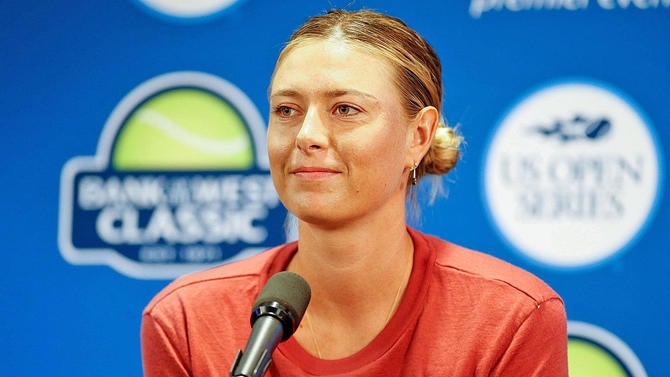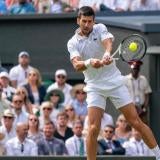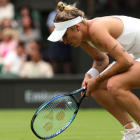
Maria Sharapova is back at the U.S. Open, controversy in tow. And she's stealing the Monday spotlight as the men's and women's singles draws get underway Monday at Flushing Meadows. The former champion, on the comeback following a suspension for performance-enhancing drugs, squares off against Simona Halep in the featured match on Monday night. In a tournament that is lacking some of its usual starpower on the women's side with Serena Williams absent due to pregnancy, Sharapova is the talk of the Open early. Here are five things to know before her match Monday night.
What was she suspended for again?
It's been a tumultuous year for Sharapova, to say the least, and she has had a lot of eyes watching her since returning to professional play in April after serving a 15-month suspension for testing positive for meldonium. Meldonium was added to the World Tennis Association's banned substances list in January of 2016, and it was revealed that she failed the test on March 7, 2016. Sharapova received a 24-month suspension that was later reduced to 15 months.
Sharapova called the positive test an oversight, claiming to take meldonium to treat a deficiency in magnesium. She claimed that she was not aware that the substance was banned, and had missed an email informing players of just that. She also denied rumors that she was warned five times about the ban, posting via Facebook:
That's a distortion of the actual "communications" which were provided or simply posted onto a webpage. I make no excuses for not knowing about the ban. The other "communications"? They were buried in newsletters, websites, or handouts (many of them technical, in small print). I didn't take the medicine every day. I took it the way my doctor recommended I take it and I took it in the low doses recommended. I'm proud of how I have played the game. I have been honest and upfront. I won't pretend to be injured so I can hide the truth about my testing.
How did other stars react to the suspension?
Sharapova received little sympathy for the miscommunication, with other notable tennis stars saying that they had trouble believing her statement. The fallout from the failed drug test was huge, with players such as Roger Federer, Andy Murray and Rafael Nadal asking for more frequent and stringent tests to ensure anti-doping regulations are followed. After appealing to the Court of Arbitration for Sport, her suspension was reduced to 15 months. "Ms. Sharapova committed an anti-doping rule violation and that while it was with 'no significant fault' she bore some degree of fault, for which a sanction of 15 months is appropriate," the court said in its ruling.
When and why was Sharapova reinstated?
Sharapova was reinstated to compete internationally in April 2017, and the U.S. Open will be her first major since her reinstatement. She received a wild card bid from the United States Tennis Association after being denied a wild-card bid from the French Open and then missing Wimbledon with a thigh injury. Some believe that the bid was gifted to Sharapova, which the USTA denies.
"Her suspension under the terms of the tennis anti-doping program was completed and therefore was not one of the factors weighed in our wildcard selection process," they said via statement. "Consistent with past practice, a wildcard was provided to a past U.S. champion who needed the wildcard for entry into the main draw."
How are players reacting to her wild card at U.S. Open?
Sharapova's wild-card bid at the year's final major is receiving mixed reactions from players.
"When someone has been banned or out of competition, I think you have to work for it a little bit to go and play your tournaments and not help that much sometimes," said Wimbledon champion Garbine Muguruza. "You've got to work hard and deserve it again. I think that's the way."
Sharapova will be facing off against Simona Halep, who has struggled against Sharapova in the past. She is 0-6 against Sharapova, but the two haven't faced off since 2015.
"I don't think any tennis fan in the world is not going to have that match on," said Madison Keys. "We all knew it was inevitable she would be back in majors and playing. I'm sure this first round is going to be interesting."
What makes this match so difficult for Halep?
It's a difficult draw for Halep, who has fallen just shy of a No. 1 ranking several times this year. Sharapova has gotten wild-card draws since her reinstatement, nine to be exact, but this is the first Grand Slam wild-card appearance. The wild-card appearance is controversial due to the rarity of it, in addition to the exigent circumstances at play.
John William Devine, a sports' ethics expert, wrote on Sharapova's case and what sets it apart from previous wild card entries. "...[Juan Martin] Del Potro was granted a wild card in 2016 when his ranking suffered because of a long-term wrist injury," Devine writes. "Sharapova has been granted a wild card because her ranking suffered while suspended for doping. These are not like cases."
Devine expounded, saying that the wild card bid shows a tolerance for doping.
As good a player as Sharapova is, very few people are taking her side on this particular issue. With doping being such a touchy subject in tennis, those who are intrinsically part of the tennis tapestry don't want their sport stained. Whether or not Sharapova knew what she was doing, whether or not malice was intended, having a five-time Grand Slam winner get caught with a positive test casts a shroud over the sport. Sharapova has a chance to redeem herself, and that starts against Halep, but it will have to go beyond the court as well.
















